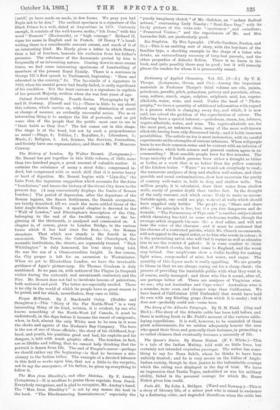Dictionary of Applied Chemistry. Vol. III. (0—Z.) By T. E.
Thorpe. (Longmans, Green, and Co.)—Among the important materials in Professor Thorpe's third volume are oils, paints, petroleum, paraffin, pitch, potassium, pottery and porcelain, silver, soap, sodium, starch, sugar, sulphur, sulphuric acid, tea, vegeto- alkaloids, water, wino, and wood. Under the head of " Photo- graphy,* we have a quantity of additional information with regard to a process which is changing every day, and which, it is now said, has solved the problem of the reproduction of colour. The following have a special interest :—petroleum, steam, tea, tobacco, vegeto-alkaloids, water, and wine. The vegeto-alkaloids are, for the most part, an unknown class, many of the more well-known alkaloids having been only discovered lately ; and it holds immense possibilities. The article on tea is most instructive, with its careful experiments on the strengths of various infusions. When will people learn to use their common-sense and be content with an infusion of five minutes, which both science and general custom agree in re- commending ? Most sensible people brew for five minutes. The large majority of foolish persons brew either a draught as bitter as Lethe, or a wash that is no better than the yellow contents of the kitchen boiler. " Water " we would ask everybody to read ; the numerous analyses of deep and shallow well-waters, and their possible and usual contaminations, show how uncertain the purity of country well-water is, both in deep and shallow wells. Ten million people, it is calculated, draw their water from shallow wells, rarely of greater depth than twelve feet. In the drought of the early summer, and which seems likely to make us uncom- fortable again, one could see pigs waterei at wells which should
have supplied only kettles Tho people "Share and share alike ;" the principle is fine, but the pra tice dangerous and de- testable. " The Permanency of Pigments" is another subject about which chemistry has told us some wholesome truths, though the average artist stoppeth his ears like a doa.f adder, and will not hear the voice of the charmer ; and it must be confessed that the charms of n restricted palette, which Mr. Church recommends, will not appeal to the rapid artist, or to him who revels in colour; it is the painstaking artist who will And it repays as well as educates him to use the restrict •d palette. It is some comfort to think that, of French clarets, the best come to England, and the worst stay behind. Our neighbours show a Gallic facility for making light wines, compounded of mint, hot water, and sugar. The quantity of this liquor made is really appalling. We are greatly to blame in that we are always crying out for a cheap claret ; the process of providing the insatiable public with what they want is, of course, easily managed ; and those who like it sound, after all, are perhaps better off. There are analyses of Virginian wine, we see ; why not Australian and Cape wine ? Australian wine is a sounder, more even, and cheaper wine than Californian. We have heard of Californian (Old Zinfaudel) that would have held its own with any Riesling grape (from which it is made) ; but it does not—probably could not—come here.


















































 Previous page
Previous page